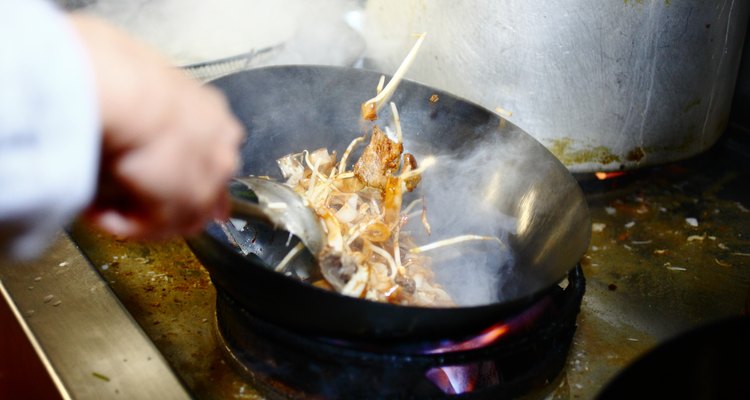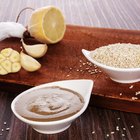
MinnaRossi/iStock/Getty Images
A marinade, which gets its name from a French phrase meaning "a dip in the sea," is a liquid mixture used to season meats and some vegetables. Marinades usually contain an acidic ingredient, such as lemon juice or vinegar, salt, and various herbs and spices. Marinades, though usually applied to raw proteins, can also form the basis of reduction sauces. Making a reduction sauce out of a marinade isn't hard, but you will need to keep a few cooking principles and precautions in mind.
Acidic Marinades
Though almost all marinades contain some form of acid, when an acidic food is the primary flavor agent in a marinade -- for example, in an orange or lime marinade -- you will need to adjust the flavor before you start heating it. Since boiling any flavorful liquid down concentrates its flavor, the tartness of your orange, lemon, lime or vinegar may become too strong. To counteract this, add 1 tsp. to 1/2 tbsp. of sugar, honey or agave nectar about a minute before your reduction sauce is done.
Barbecue-Style Sauces
You can use barbecue sauces, either bottled or homemade, as both marinades and reduction sauces. However, you will need to exercise caution when making reduction sauces out of barbecue sauce. These sauces usually include sugar in the form of brown sugar, honey or molasses. While heating these produces new flavor compounds, sugars turn bitter if overheated. Keep an eye on the sauce and remove it from the heat source before it turns from brown or black. Also, use care when handling the sauce, as sugar-based liquids are sticky and can cause burns if they get on your skin.
Other Marinades
Citrus-flavored and barbecue -style marinades aren't the only marinades available. Asian-style marinades, which rely on the exotic flavors ginger, lemongrass as well as more familiar flavors such as garlic and scallions, put a delicious twist on chicken, fish or tofu. You can make reduction sauces out of Asian marinades, but you'll need to be careful with homemade marinades containing ginger or garlic. These burn easily and can turn your sauce bitter. To guard against this, cut the pieces slightly larger than the recipe calls for and strain the sauce through a fine mesh strainer before serving, which will remove any burned bits without removing flavor.
Safety Considerations
Cross-contamination -- which occurs when juices from raw foods come into contact with cooked foods, counter-tops or hands -- is a major cause of food-borne illness, according the to the U.S. Department of Agriculture. Although boiling kills any dangerous pathogens that might have come from the raw meat, it won't destroy toxins. Since bacteria and molds grow best at room temperature, the FoodSafety.gov website recommends you always marinate meat in the refrigerator. If you want to be sure your sauce is safe, make twice the amount of marinade your recipe calls for and set half aside, adding the meat to the other half. That way, you can use the clean, fresh marinade to make the sauce.
Related Articles

How to Degrease Sauce

How Can I Counteract the Sourness of a ...

Tips for Grilling Steak With A1 Sauce

How to Use Leftover Marinade in Gravy

How to Make Chipotle Sauce

How to Marinate Meatballs

How to Know if Marinated Steak Is Bad

Can You Use Flour to Thicken Chili?
How to Marinate Seitan

How to Cook Bear Steaks

How to Marinate Steak

Can You Use Half and Half to Replace ...

How to Cook Barbecue Deer in the Slow ...

How Long Can You Refrigerate Nacho ...

How to Keep Meatballs Moist While ...

Calories in Tahini Sauce

How to Make Cayenne Pepper Sauce
Do You Drain the Marinade Before ...

How to Tenderize Beef for Country Fried ...

Does Cooking in Sauce Keep Meatballs ...
References
Resources
Writer Bio
Melanie Greenwood has been a freelance writer since 2010. Her work has appeared in "The Denver Post" as well as various online publications. She resides in northern Colorado and she works helping to care for elderly and at-risk individuals. Greenwood holds a Bachelor of Arts in pastoral leadership from Bethany University in California.
Photo Credits
MinnaRossi/iStock/Getty Images